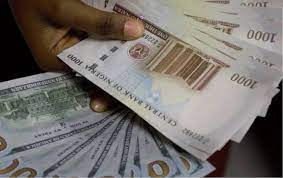Professor of Finance and Capital market at the Nasarawa State University Keffi Uche Uwaleke says the plan by the Central.Bank of Nigeria to unify the exchange rates would lead to increased capital inflow for the three tiers of government.
Uwaleke, who spoke to Blueprint on the backdrop of plans by the Apex Bank to adjust the official Exchange rate to align with the rate in the Autonomous Foreign Exchange Market
According to him, the federal, state and local government councils will have more money to spend.
Also, It eliminates opportunities for currency round-tripping and sharp practices associated with having multiple Exchange rates thereby promoting transparency in the country’s forex market, he added.
Over the years, there have been strident calls by experts on the banking sector regulator to unify the various exchange rates which many have said distorts the market. Presently, the official exchange rate of the naira to the dollar stands at N380.
“By the same token, it will enable price discovery as the real value of the naira becomes established through demand and supply forces as not a few think that the naira is overvalued. Similarly, it will engender clarity in the country’s forex market with the potential to attract foreign investors.
“Furthermore, the associated fall in the value of the naira in the near term could encourage non-oil exports and discourage imports thereby facilitating the government’s import substitution policy and improving the Balance of Payments,” Uwaleke, who also doubles as the President of Capital Market Academics said.
The former Imo State finance commissioner, explained further that the measure will be in line with the expectations of international financial institutions especially the IMF and the World Bank who, over the years have encouraged unify its exchange rates.
Despite the inherent benefits, the president of Capital Market Academics pointed out that abolishing the official Exchange rate and leaving the fate of the naira entirely to market forces has grave implications for an economy having a single product, crude oil, as the principal source of foreign exchange.
He noted that with oil revenue accounting for over 90% of foreign exchange, the exchange rate unifications would increase the dollar-denominated spending of the government.
“So, it puts pressure on external reserves depleting it in the process, worsens the burden of the country’s external debt service obligations, makes the 2020 budget unrealistic and unachievable having been based on exchange rate of N360 per dollar and by extension the recently-approved Medium Term Expenditure Framework. Besides, essential items that have enjoyed access to forex at the official subsidized rate such as petroleum products imports will have no choice but use the single market for forex.
“The immediate implication is increased cost of importing petroleum products which will lead to a hike in the pump price of fuel especially now the downstream sector is being deregulated. It goes without saying that, in view of the import-dependent nature of the Nigerian economy, any upward adjustment of exchange rate will feed into higher inflation rates at least in the short run necessitating tight monetary policy by the CBN and high interest rate environment.
He therefore urged the Apex Bank to, while leveraging the upsides of exchange rates’ unification, ensure the downside risks are mitigated.
This, he noted, can be done by “developing multiple sources of foreign Exchange outside oil, especially via Agriculture and Solid minerals, while vigorously promoting the use of domestic products and services by supporting their availability at competitive prices,”




